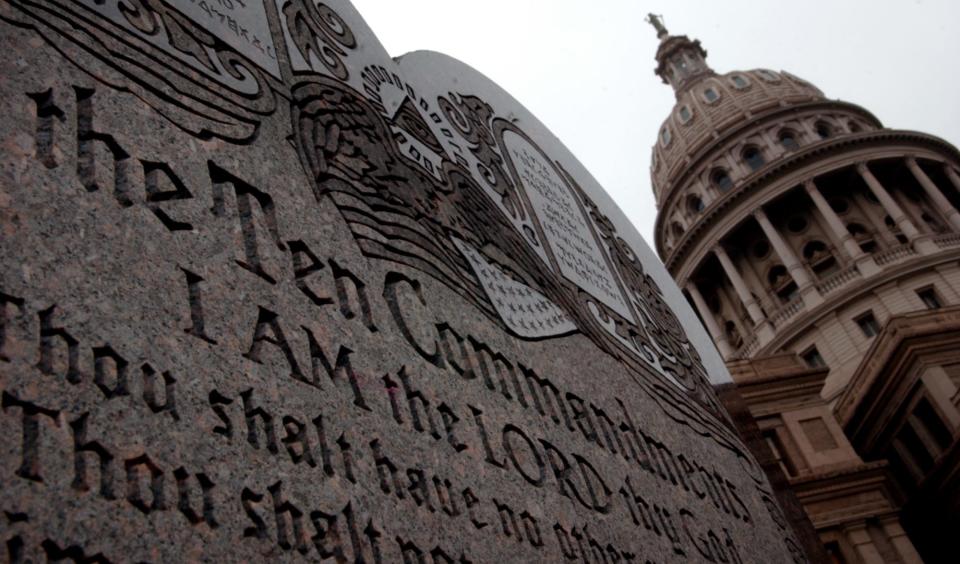Opinion: Ten Commandments bill excluded many and devalued Jewish origins
Texans dodged a religious bullet. In the most recent state legislative session, legislators almost passed a bill, Senate Bill 1515, that would have required the display of the Ten Commandments in public school classrooms. It is likely to be resurrected in the next legislative session.
I hope it’s not, because of the bill’s exclusionary character and its implicit anti-Judaism.
The bill would have mandated using an abbreviated version of the Ten Commandments drawn from the King James translation of Exodus chapter 20 and popularized in American culture in the 1956 Cecil B. DeMille film “The Ten Commandments.” This version is already publicly displayed on the grounds of the Texas State Capitol.
This version of the Ten Commandments has problems. To begin, although the Bible refers to “the Ten Commandments” or “the Ten Words,” our sense of a list of 10 clearly demarcated commandments is mistaken. It is not clear how you arrange the two different versions of the Ten Commandments in the Bible, one in Exodus and the other in Deuteronomy, into 10 different commandments. Jews, Reformed Christians, Lutherans, Roman Catholics and Samaritans all parse the list differently to get to the number 10. The proposed legislation does not follow any of these enumerations.

There is also the issue of language. English is the predominant language in the state, but there are more than 7 million Texans living in Spanish-speaking households. Shouldn’t schools in majority Spanish-speaking areas be able to display the Ten Commandments in Spanish?
The selection of the King James translation is also exclusionary. Not only is this translation not used in Jewish practice, its Protestant origins make it anathema to the approximately 6 million Roman Catholics living in Texas. This is to say nothing of those Texans who come from a religious tradition that does not include the Ten Commandments in their scriptures or who are religiously unaffiliated.
Finally, this version of the Ten Commandments is abbreviated in an implicitly anti-Judaic way. Noticeably absent are any references to the ancient Israelites. The Israelites’ experience of liberation from slavery in Egypt is expunged from the first sentence of the bill’s version of the Ten Commandments. All that remains is the generic statement “I am the LORD your God.” Similarly, the language in the bill uses the Exodus version of the Sabbath commandment, “Remember the Sabbath day, to keep it holy,” and ignores Deuteronomy’s version, which describes observing the Sabbath as a memorial to ancient Israel’s exodus experience.
Deleting any mention of the people of Israel has consequences. By taking the Ten Commandments out of their historical context and their connection to a particular religious community, this bill generalizes the commandments as an expression of what its authors perceive as universal American values, albeit important social values. In effect, it devalues the Jewish people through their omission.
Although this legislation lacks the polemical character of classical Christian anti-Judaism, it does participate in the enduring American tradition of usurping the legacy of the Israelites so as to apply it to the United States without acknowledging that these words come from the scriptures of the Jewish people. This appropriation is a manifestation of a much longer history of Christian supersessionism, in which the people of Israel are replaced as God’s chosen people (in this case by the United States rather than the Church). In effect, it devalues the Jewish people.
It may not be the intent of the Texas bill to erase the historical context of the Ten Commandments, exclude the religious perspectives of a substantial minority of the state’s population, or contribute to the reemergence of a supersessionist form of nationalism. But, if it or similar legislation is enacted into law, the effect will be to, at the very least, cultivate a society that is less inclusive of all its members, particularly its Jewish ones, and, at its very worst, contribute to blatant antisemitism.
Kaplan is an associate professor in the Department of Middle Eastern Studies at the University of Texas.
This article originally appeared on Austin American-Statesman: Opinion: Ten Commandments bill excluded many and devalued Jewish origins

